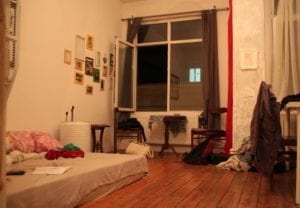Nicholas Glastonbury
Istanbul, Turkey
Hakikat, Adalet, ve Hafıza Çalışmaları Merkezi
I’ve been making a lot of introductions lately. A summer research internship, living in a new city (well, I’ve lived in Istanbul before, but I’ve never lived in this neighborhood; if you’ve ever been here, you know it makes a big difference), new roommate, new roommate’s friends, going to the gym. This, too, is an introduction, this blog post—hi, my name’s Nick, I’m an undergrad at Gallatin, studying (more or less) memory and identity in post-conflict societies, I’m kind of unreasonably obsessed with Turkey. This is my house:
It’s great, all these introductions. (Now you know me, too.) It’s awesome.
But something I’ve noticed in the past week (this is my third week in Istanbul this summer, my second week on the job) is that whenever I mention that I study human rights—because, let’s be real, explaining your concentration is hard enough in your own language, much less in Turkish—I’ve gotten a surprisingly common response from a lot of people. “Oh, because we don’t have those here?” or “Wow, must be interesting studying something like that in a country where they don’t exist. (These are not exact translations, it must be noted.)
I know I’ve definitely heard this sort of thing before, when I studied abroad here and in Izmir last spring and summer. But I’m only just realizing that this is something a lot of people have on their minds, and I wonder how productive a line of thought it is.
I think it’s very easy to get down about all of the things that are wrong in the world, or in local or national contexts, or with politics or economics or the human rights movement as a whole. And there is absolutely value in recognizing the flaws in the contexts in which we live or are interested, or in the discourses that surround us. But I also think it’s important to recognize the progress that has been made, the steps that have been taken. In Turkey, just over twenty years ago, it was illegal to even speak Kurdish in public. Today, however, I sat around a table with seven other people in a Kurdish language course organized by the Kurdish Institute of Istanbul. Today, there are Kurdish language television programs aired on state-owned networks. That’s big. It’s not enough, but it’s big.
I am more than well aware that the current state of affairs in Turkey is less than ideal. Şeyma Özcan, a third-year political science at my study abroad alma mater, Boğaziçi University, was arrested for applying for an internship at a leftist newspaper, and was only released about a month ago. Cihan Kırmızıgül, a student of mechanical engineering at Galatasaray University, was arrested a little over two years ago for being near the scene of a bombing-by-Molotov-cocktail, while wearing a poşu (more broadly known as a keffiyeh) around his neck. [The poşu is typically associated with the southeastern provinces, and by proxy, it is associated with the Kurds.]
Kırmızıgül’s case just came before a court last month, when he was sentenced as a terrorist to 33 years and 9 months in prison, an absolutely ridiculous mockery of the institution of justice. In the last two-and-a-half weeks or so, in an act of incredible political cunning to divert criticisms and attention from an airstrike in Uludere that mistakenly targeted civilians as terrorists and killed 34 people, Prime Minister Recep Tayyip Erdoğan has made statements saying that abortion should be banned and saying that “Every abortion is an Uludere” (“her kürtaj bir Uludere’dir”). The mayor of the capital Ankara, even, in response to one woman’s outrage on Twitter, sent her a private message that said “Have you had a lot of abortions, is that why you’re yelling so much?” (“sen çok mu kürtaj yaptırdın,bu kadar bağırmanın nedeni bu mu ?”). The outrage from broad segments of society has been very vocal, but it has, to say the least, served as a distraction from the botched airstrike.
In other words, there’s a lot that isn’t going so well in Turkey. But if we don’t acknowledge the successes that have been made through the hard-won battles that have been doggedly pursued by activists, civil society organizations, intellectuals, NGOs, then it just becomes too overwhelming, too Sisyphean, to keep fighting the good fight. I know that’s what my colleagues have been doing for years, and I’m glad that I can be a part of that.
